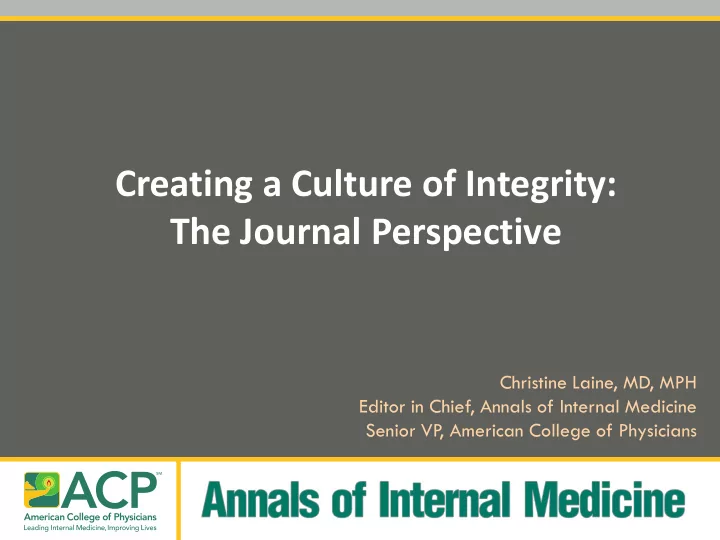

Creating a Culture of Integrity: The Journal Perspective Christine Laine, MD, MPH Editor in Chief, Annals of Internal Medicine Senior VP , American College of Physicians
Integrity Issues that Journals Encounter Conflicts of Interest Authorship IRB approval/participant consent Redundant publication Plagiarism Inadequate data archiving Confidentiality 2
Undisclosed Conflicts of Interest Public trust in the peer review process and the credibility of the published biomedical literature depend in part on how well researchers and editors handle conflict of interest . 3
Conflict Disclosure: ICMJE Policy All in the research/review/publication process must disclose whether or not potential conflicts exist-- personal and institutional conflicts require disclosure Journals may use information in editorial decisions and should publish information on potential conflict of interest Journals consider purposeful failure to disclose conflicts to be misconduct and will notify institution/publish a correction 4
Conflicts of Interest Having a conflict of interest is not scientific misconduct, but purposeful failure to disclose a conflict is. 5
Authorship Author: an individual who has made substantive intellectual contributions to a published work 6
Why Authorship Matters Biomedical authorship has academic, social, and financial implications Readers want/need to know who did what Identifies who is accountable for the integrity of the work 7
Types of Author Contributions obtaining funding conception &design drafting of the article analysis & interpretation of data critical revision for important intellectual provision of study content materials or patients final approval of the collection & assembly article of data guarantor statistical expertise other administrative/technica l/logistical support 8
ICMJE recommends that authorship be based on the following 4 criteria: Substantial contributions to the conception or design of the work; or the acquisition, analysis, or interpretation of data for the work; AND Drafting the work or revising it critically for important intellectual content; AND Final approval of the version to be published; AND Agreement to be accountable for all aspects of the work in ensuring that questions related to the accuracy or integrity of any part of the work are appropriately investigated and resolved. 9
Contributions that Don ’ t Alone Justify Authorship Acquisition of funding Collection of data Referral of patients Provision of study samples General supervision of the research group 10
Authorship: Fundamental Principles All persons designated as authors should qualify for authorship All those who qualify should be listed Each author should have participated sufficiently in the work to take public responsibility for appropriate portions of the content 11
COPE Flowcharts: Authorship Issues Corresponding author requests addition of extra author before publication Corresponding author requests removal of author before publication Request for addition of extra author after publication Request for removal of author after publication Suspected guest, ghost or gift authorship [ How to spot authorship problems 12
ICMJE: Protection of Research Subjects When reporting research involving human data, procedures followed should have been assessed by a responsible review committee If no formal ethics committee, procedures must be in accord with the Helsinki Declaration Approval by a responsible review committee does not preclude editors from forming their own judgment whether the conduct of the research was appropriate 13
ICMJE: Protection of Research Subjects Researchers expected to maintain patient privacy unless they have patient consent not to maintain patient privacy. Researchers expected to obtain adequate participant consent and to state so in their articles If a journal editor becomes aware of a breach of the above, he or she should inform the responsible institution and suggest investigation 14
Redundant/Duplicate Publication When authors submit a manuscript reporting work that has already been reported in large part in a published article or is contained in or closely related to another paper that has been submitted or accepted for publication elsewhere, the letter of submission should clearly say so and the authors should provide copies of the related material. Authors who attempt redundant/duplicate publication without such notification should expect at least prompt rejection of the submitted manuscript. If the editor was not aware of the violations and the article has already been published, then the article might warrant retraction with or without the author’s explanation or approval. 15
Plagiarism: Council of Science Editors Plagiarism is the appropriation of ideas, data, or methods from others without adequate permission or acknowledgment. Plagiarism can apply to researchers’ duplication of their own previously published reports without acknowledgment (self-plagiarism/duplicate publication. 17
Inadequate Data Archiving ICMJE believes investigators have a duty to maintain the primary data and analytic procedures underpinning the published results for at least 10 years. The ICMJE encourages the preservation of these data in a data repository to ensure their longer- term availability. Unavailability of data to address concerns surrounding the work can raise questions about the integrity of the work. 18
Confidentiality Expectation is that editors and reviewers keep confidential the manuscripts that are under review They should not use the content in the manuscripts under review to further their own purposes Should not retain copies of reviewed manuscripts 19
In Summary… Journals witness a variety of scientific integrity issues First action is most often to query the authors Next step is generally to notify the responsible institution(s) and funding organizations. 20
Resources www.icmje.org www.councilofscienceeditors.org www.wame.org www.publicationethics.org 21
Questions? 22
Recommend
More recommend